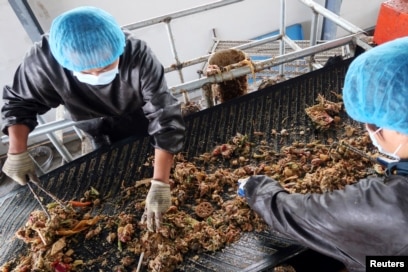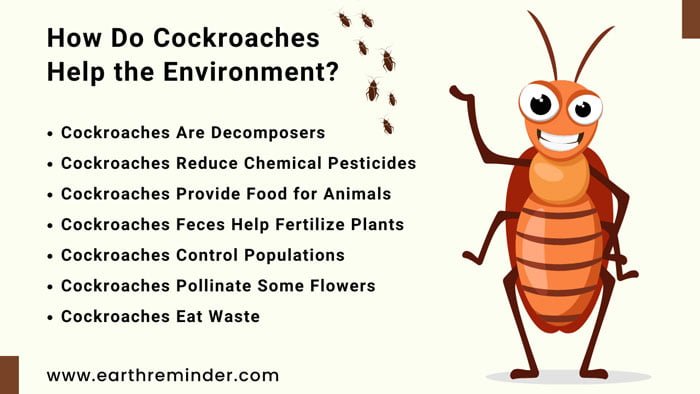Cockroaches play a crucial role in nutrient recycling and are a food source for various animals. Their ability to consume almost anything makes them important decomposers in ecosystems.
Cockroaches may make many of us cringe, but their existence is beneficial to the environment and, indirectly, to humans. These resilient insects are exceptional recyclers, breaking down dead and decaying matter, thus returning vital nutrients to the soil, supporting plant growth.
They serve as a valuable food item for birds, mammals, and reptiles, contributing to the biodiversity and health of natural habitats. In scientific research, cockroaches offer insights that can lead to medical and technological advancements. Despite their infamous reputation as pests, cockroaches are ecological powerhouses, sustaining the delicate balance of our planet’s ecosystems. Their presence, while often unwelcome in our homes, is a testament to the interconnectivity of life and the importance of every species, no matter how small or seemingly insignificant.

Credit: insectsinthecity.blogspot.com
Cockroach Contributions To Ecosystems
Cockroaches, often seen as pests, play a crucial role in our ecosystems.
Decomposers In Nature
Cockroaches break down dead matter, turning it into nutrients. This helps soil enrichment and supports plant growth.
Nutrient Cycling Facilitators
As nutrient recyclers, cockroaches help maintain ecosystem health by balancing microbial populations.

Credit: blog.therainforestsite.greatergood.com
Cockroaches In The Food Web
Many creatures in the ecosystem find their next meal in the least expected places. Cockroaches play a crucial role within the food web.
Prey For Various Animals
Omnivores and carnivores alike rely on cockroaches as a food source. They are essential in sustaining various animal populations. Examples include:
- Birds that snatch cockroaches for a quick snack.
- Small mammals like mice and shrews hunt them for protein.
- Reptiles and amphibians, such as frogs and lizards, thrive on them.
- Insectivorous insects also feed on smaller cockroach species.
Role In Maintaining Biodiversity
Cockroaches help maintain ecological balance. They break down dead matter, turning it into material that plants can use. Their actions support:
- Soil health: Decomposing organic materials enrich the soil.
- Plant growth: Nutrients from decomposed matter aid in growth.
- Cycle of life: By being prey, they help predators survive.
Without them, biodiversity could decline, harming the environment.
Unexpected Provisions
Think cockroaches are just pests? Think again! These insects offer some Unexpected Provisions that might surprise you. From their role in the ecosystem to their potential in science, cockroaches have more to offer than we often give them credit for.
Protein-rich Food Source
Cockroaches could be the next big thing in sustainable protein. They are loaded with nutrients that are essential for health. Surprising, right? Here’s a quick look at what these little critters pack nutrition-wise:
- High-quality protein
- Fats, especially omega-3 fatty acids
- Essential amino acids
With these nutrients, cockroaches can serve as a food source for both humans and animals, especially where traditional meat is scarce or unsustainable.
Farming For Feed And Pharmaceuticals
Not just food, cockroaches are making waves in the farming industry too. Here’s how:
| Use | Benefits |
|---|---|
| Animal Feed | They’re a cost-effective, high-protein feed for livestock. |
| Pharmaceuticals | Research suggests cockroach extracts could help in curing diseases. |
Cockroach farming is becoming more popular because of these uses. Farmed cockroaches can become valuable assets in feed production and medicine development.
Cockroaches In Scientific Research
Cockroaches often get a bad rap, but they offer unique advantages to science. Researchers study these resilient insects to understand biology and improve technology. Below are two fascinating areas where cockroaches play a pivotal role.
Study Of Locomotion
Cockroaches are masters of movement. Their ability to quickly navigate obstacles provides insights into animal locomotion. This is crucial for understanding how living creatures move.
- Speed: They dash at high speeds, even over rough terrain.
- Maneuverability: Cockroaches can turn on a dime to escape threats.
- Stability: Their six legs keep them stable over uneven surfaces.
Scientists record these insects with high-speed cameras. They learn how cockroaches twist and bend their bodies. This research helps biologists grasp the mechanics of movement in many creatures.
Advancements In Robotics And Prosthetics
The design of cockroaches inspires cutting-edge robots and prosthetics. Their durability guides engineers in creating tough, terrain-adaptable robots.
| Aspect | Influence on Robotics |
|---|---|
| Exoskeleton | Durable materials used to build robots that withstand impact. |
| Legs | Designs that mimic the efficiency of cockroach locomotion. |
Prosthetic limbs benefit too. Features such as quick response and adaptability are drawn from cockroach physiology. This results in prosthetics that offer better control and mobility for users.
Robots can now negotiate rough terrain, thanks to the cockroach blueprint. They crawl or walk with stability and ease. People with limb loss experience improved function in prosthetics that borrow from these insects.
Cockroaches And Human Health
Considered pests by many, cockroaches hold a different story when we dive into their potential benefits to human health.
Traditional Medicinal Uses
Throughout history, these resilient insects have been sources of traditional remedies. In some cultures, cockroaches are dried and ground into powders. This powder has treated ailments from stomach upsets to skin conditions.
- Traditional Chinese medicine frequently includes cockroach preparations.
- In Latin America, cockroaches are used to aid healing of wounds.
Potential For Allergy And Disease Control
Despite being carriers of pathogens, studies show cockroaches could help in allergy control.
| Research Area | Potential Benefit |
|---|---|
| Immune System | Exposure to cockroach allergens may strengthen immune responses, reducing allergy and asthma symptoms. |
| Vaccine Development | Their complex immune systems could inspire new vaccines for various diseases. |
Furthermore, cockroach extracts have shown antimicrobial properties. These properties could lead to the development of novel antibiotics.
- Antibacterial compounds are identified from cockroach brains.
- Cockroach cuticles contain substances that may fight off bacteria.
Insects As Recyclers
Cockroaches play a crucial role in our ecosystem, particularly as recyclers. These hardy insects help clean up dead and decaying matter. By doing so, they contribute to nutrient cycling, which is essential for soil health. Let’s explore how cockroaches turn waste into an ecological goldmine.
Conversion of WasteConversion Of Waste
Cockroaches are nature’s unsung heroes of waste disposal. They feast on scraps humans leave behind. By consuming our waste, cockroaches reduce landfill burdens. Here’s how they benefit our environment:
- Less waste in our environment means reducing pollution.
- Cockroaches act as bio-converters, turning waste into compost.
- Contribute to the food chain by becoming a meal for other species.
Organic Matter Breakdown
Beyond waste, cockroaches break down organic matter. This is crucial to maintain soil fertility. Here’s what they specifically break down:
| Type of Matter | Role in Ecosystem |
|---|---|
| Dead Plants | Returning nutrients to the soil |
| Animal Remains | Quick decomposition prevents disease spread |
| Food Scraps | Added nutrients for plants and reduction of waste |
Breakdown of organic materials by cockroaches is not just about cleanliness. It supports biodiversity. Plants need the nutrients that cockroaches help return to the soil. This process benefits the entire ecosystem.
Cockroach Farming Practices
Cockroach farming is an intriguing practice, finding favor for its surprising benefits. These resilient insects offer environmental and economic perks that catch many by surprise. From waste recycling to providing alternative protein sources, cockroaches could play a vital role in sustainable practices.
Methods Of Cultivation
Effective cockroach farming hinges on the right cultivation methods. Consider these steps:
- Select species: Choose species like the Blaptica dubia for protein or the Periplaneta americana for medical purposes.
- Create habitat: Maintain a warm, humid environment with dark spaces for hiding.
- Provide nutrition: Offer a varied diet of grains, fruits, and vegetables for a balanced nutrition profile.
Commercial Uses And Benefits
Cockroach farming yields various commercial uses:
| Use | Benefit |
|---|---|
| Animal Feed | Provide high-protein feed for poultry and fish. |
| Pharmaceuticals | Extracts aid in healing wounds and treating diseases. |
| Waste Processing | Recycle organic waste, cutting down landfill mass. |
Conservation Perspectives
Often viewed as pests, cockroaches play an essential role in our ecosystem. Here’s why their conservation matters.
Ethical Considerations
Respecting all forms of life is key in the conservation world. Cockroaches have existed for millions of years, evolving into key ecological players. Their right to exist must be considered alongside our biases against them.
Many cultures hold beliefs that emphasize the intrinsic value of all creatures. In this light, cockroaches deserve ethical consideration and protection from indiscriminate harm.
Impact Of Cockroach Extinction
The extinction of cockroaches would have ripple effects on ecosystems worldwide.
- They are resource recyclers, breaking down organic waste.
- Many species rely on them as a crucial food source.
- Soil health benefits from their activity.
Without cockroaches, we could see a breakdown in the nutrient cycle and a surge in waste materials, disrupting habitats and food chains.
Their role in scientific research and pest control also adds to the negative impact their loss would cause. Preserving these insects secures environmental balance and ongoing benefits for humans and nature alike.
Public Attitudes And Misconceptions
Many people squirm at the thought of cockroaches. Yet, these ancient insects hold remarkable benefits for ecosystems and could inspire scientific advances. Now, let’s explore cultural perceptions and correct common myths.
Cultural Views On Cockroaches
Cockroaches often evoke a strong reaction. In some cultures, they symbolize dirtiness and disease. In others, like in China, cockroaches are farmed for medicinal purposes. They contribute to ecosystem health and scientific research.
Informing The Narrative
To change public opinion, we need to spread knowledge. Cockroaches decompose waste, support other species, and even provide a protein-rich food source. Let’s highlight their positive roles in nature and technology.
Did you know? Cockroach farming is a growing industry. Scientists study cockroach biology for advancements in robotics and medicine.

Credit: learningenglish.voanews.com
Frequently Asked Questions
Are Cockroaches Beneficial To Humans?
Yes, cockroaches decompose organic waste and are a food source for other animals. They also have potential in medical research.
Are Cockroaches Used For Anything?
Cockroaches serve purposes in ecosystems, as feed for pets, and in scientific research. They are also used in medicine and as a protein source in some cultures.
What Would Happen If Cockroaches Went Extinct?
If cockroaches went extinct, ecosystems would lose important decomposers, disrupting nutrient cycles. Animal species that feed on cockroaches might struggle for survival or decline.
Conclusion
Despite their notorious reputation, cockroaches play a vital ecological role. They break down waste, provide a food source for other animals, and have even inspired medical and technological advancements. Embracing the positive aspects of these resilient insects gives us a broader perspective on their existence and contributions to the environment.
So, the next time we see a cockroach, let’s acknowledge their benefits, even as we strive to keep them out of our homes.
Related posts:

I’m MD Tanvir, and I bring years of expertise gained from working closely with pest control companies to the forefront. My journey in the industry has inspired me to launch Bug Battler, a platform aimed at equipping people with the know-how to combat pests autonomously. Through Bug Battler, I aim to empower individuals with practical insights to tackle pest infestations effectively.

